The new year dawns on a significant changing of the guard in the Wisconsin right-to-life movement. Three of the state’s top pro-life organizations are in transition, with veteran directors giving way to a new generation of leadership as the state’s overall abortion rate decreases.
Sidewalk counselor and 40 Days for Life coordinator Dan Miller is at the helm of Pro-Life Wisconsin, an organization founded in 1992 and headquartered in Brookfield. Peggy Hamill, outgoing director of 15 years, will officially retire March 31, though Miller has already assumed responsibilities as full-time state director.
Pregnancy crisis center Milwaukee Birthright Inc. is also undergoing a change in administration. Executive director Veronica 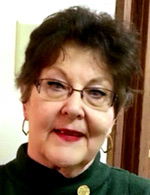 Veronica CeszynskiCeszynski, involved with the organization since 1972, stepped down from her post on Jan. 1, with longtime volunteer Judy Fecteau succeeding her.
Veronica CeszynskiCeszynski, involved with the organization since 1972, stepped down from her post on Jan. 1, with longtime volunteer Judy Fecteau succeeding her.
This past fall, the Catholic Herald reported on the retirement of Barbara Lyons as the executive director of Wisconsin Right to Life, a post she had held since 1987. Her replacement, Heather Weininger, assumed that role on July 1, after several months on the WRTL legislative and political action committee.
All three new executive directors bring years of political and social activism to their positions, and all are devout Catholics. 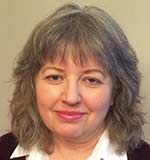 Judy FecteauThis change in leadership comes at a time when highlighting the church’s teaching on abortion is especially important for young Catholics, said Miller, who cited the Guttmacher Institute’s July 2014 “fact sheet” that noted 28 percent of American women who procure abortions identify themselves as Catholic.
Judy FecteauThis change in leadership comes at a time when highlighting the church’s teaching on abortion is especially important for young Catholics, said Miller, who cited the Guttmacher Institute’s July 2014 “fact sheet” that noted 28 percent of American women who procure abortions identify themselves as Catholic.
“As a Catholic, at first I was embarrassed by this shocking statistic,” said Miller, a member of SS. Peter and Paul Parish, Milwaukee. “I wondered how this could possibly happen – but then I realized it was my own fault. My former silence on this issue indicted and convicted me. It convicted me to do more and never be silent in the face of evil. Period.”
Became a ‘Birthright grandma’
Though Veronica Ceszynski, member of St. Eugene Parish, Fox Point, has four grandchildren of her own, she is proud that she is – as she calls it – a “Birthright grandma.”
“Years ago, I had one young lady call me one morning very early, and she said, ‘I have an abortion scheduled in a half an hour. What can you do instead?’” recalled Ceszynski. “I said, well, I can wake up and have a cup of coffee and we’ll continue to talk.”
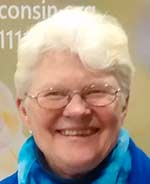 Peggy HamillCeszynski encouraged the young woman to come in and visit the Milwaukee Birthright center. The two spent the entire day talking, and Ceszynski located a hospital in Illinois for at-risk mothers that would care for the woman. She had her baby, who in turn grew up, married, and had several children of his own. Ceszynski and the woman are friends to this day.
Peggy HamillCeszynski encouraged the young woman to come in and visit the Milwaukee Birthright center. The two spent the entire day talking, and Ceszynski located a hospital in Illinois for at-risk mothers that would care for the woman. She had her baby, who in turn grew up, married, and had several children of his own. Ceszynski and the woman are friends to this day.
That round-the-clock fellowship is perhaps the hallmark of Milwaukee Birthright’s ministry. The faith-based, non-denominational pregnancy crisis center, which operates in Wheaton Franciscan’s Medical Arts pavilion on West Oklahoma Avenue, offers a 24-hour confidential emergency hotline where 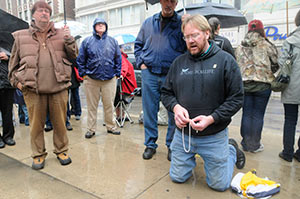 Dan Millerpregnant women can receive advice, resources or simply a shoulder on which to lean. Birthright also offers free pregnancy testing, baby supplies and referral resources.
Dan Millerpregnant women can receive advice, resources or simply a shoulder on which to lean. Birthright also offers free pregnancy testing, baby supplies and referral resources.
Her own experience with motherhood led Ceszynski to Birthright. The 1973 Roe vs. Wade decision had just been handed down by the United States Supreme Court, and the mother of two adopted daughters was profoundly affected by the court’s ruling.
“I was just glad that my children had been born at that time,” she said. “I was searching for something to do to thank two unnamed birth mothers whom I would never meet. I was so glad that they made the decision to place their children for adoption.”
Volunteering a way to say ‘thank you’
One Sunday, while attending Mass at Milwaukee’s Holy Rosary Parish, she heard Marie Hern speak. Hern had founded Birthright only the year before at St. Anthony Hospital, in anticipation of the Roe vs. Wade decision. It was the first pregnancy crisis center in Wisconsin.
“I thought, now there’s something I could do for a couple weeks to say thank you to these women,” said Ceszynski. “And all these years later, I’m still around.”
Ceszynski became Birthright’s second executive director in 1996 after Hern’s retirement. She feels most proud of the fact that, for 44 years, Birthright has been a place of safety, community and support for women during a time when they feel the most alone.
“I figured, looking back through our records, it’s thousands (of lives saved by Birthright’s services),” said Ceszynski. “In the earlier days, people would call at two, three in the morning. They would wake up in the middle of the night or not go to sleep, and be so frightened and not know what to do, and they would call our number and there we were.”
Ceszynski retired this year, handing administration over to Fecteau, a member of St. Mary Parish, Hales Corners. She will still volunteer at the office every other week, and take a shift on the emergency hotline. She chose to retire, she said, because, “I thought it was time to have fresh insight. We’ll be going in the same direction, following the same mission, but I think (Fecteau) has got some fresh ideas. We desperately need volunteers, and I think she’s got some good ideas for volunteer development.”
First priority gaining volunteers
Fecteau said increasing volunteerism will be her first priority as director. Currently, the office is only open three afternoons a week, from noon to 4 p.m. She wants to see that increased to at least five afternoons a week, and hopes to raise awareness of the center’s services.
An occupational therapist by trade, Fecteau became involved with Birthright in 1998. Newly widowed, she moved to Milwaukee from the northwoods to be closer to her family. She began working at Wheaton Franciscan’s St. Francis Hospital, and while there, learned about Birthright.
“I’m a big supporter of choosing life, and so that appealed to me, that I would be doing something that would help women 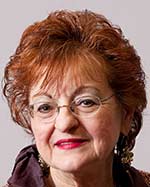 Barbara Lyonsto keep their babies, by giving them clothes and the services that they need,” said Fecteau, the mother of one son and four stepchildren.
Barbara Lyonsto keep their babies, by giving them clothes and the services that they need,” said Fecteau, the mother of one son and four stepchildren.
She found such fulfillment in the work that she began volunteering more frequently. She said that getting to hand out donated clothes, supplies and baby items to mothers in need is like “playing Santa Claus. It’s just a wonderful feeling. And they’re very appreciative.
“Many of these women – they come to us from all different religions, different backgrounds and they’re all really wanting to keep their babies after they give birth or before they do,” she said.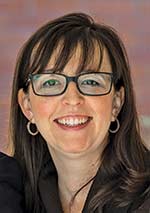 Heather Weininger
Heather Weininger
There are also women who call seeking abortions, but Birthright will not give out such information. Instead, said Ceszynski, “We offer whatever the woman needs to stay healthy herself and keep a healthy baby.”
Without being overbearing, Fecteau counsels the women to reconsider their decisions to abort. “And I pray for them after I hang up – that’s the only thing I can do,” she said. “There’s no joy like a woman who calls back and says I’ve changed my mind, I’m going to have this baby.”
‘I didn’t even want to hold a sign’
Miller was anything but enthusiastic about his first 40 Days for Life campaign on Ash Wednesday in 2010. The self-described “cradle Catholic” identified as pro-life, but was intimidated by the reality of keeping vigil outside Affiliated Medical Services, an abortion clinic on Farwell Avenue.
“The first thing out of my mouth was that I’d rather have all four wisdom teeth pulled without anesthetic,” said Miller, recalling his reaction to being invited to the prayer vigil. “I didn’t even want to hold a sign.”
Prior to this experience, Miller said, thinking about abortion was “not whatsoever” a part of his daily life, despite his Catholic faith, his attendance at church and his graduation from Catholic grade and high school. “It wasn’t something that I thought would ever affect me, and it was really never talked about in our family. And, quite frankly, it was talked about very rarely at school and church.”
The first day outside the clinic didn’t have much of an effect on him – he found out later that it was an administrative day for staff, and few clients came. The second day on the Farwell Avenue sidewalk, he said, changed his entire outlook on the pro-life movement.
“We stopped counting after 35 women went in,” he said. “We saw them going in pregnant, and some we saw coming out not pregnant anymore – and hurt, hunched over, in obvious pain from the abortion procedure.”
The experience made him think of his childhood in Burlington, when he would often accompany his mother to her job as a special education teacher. As a child, he saw his mother teach many children with Down syndrome. As he grew older, those children began disappearing.
“Over 91 percent – some claim it’s as high as 95 percent – of children who are diagnosed with Down syndrome are aborted,” said Miller. And standing there on the sidewalk on that second day of Lent, he realized those disappearing children from his childhood were “a living testimony to me that everything that the pro-life sector is saying about how abortion affects us is absolutely true.”
More than 5,000 hours on the sidewalk
Miller not only returned to the 40 Days for Life campaign many times over, he became the event’s coordinator the following year. Miller has put in over 5,000 hours of volunteering on the sidewalk outside Affiliated Medical Services, and reports that 620 lives have been saved since August 2010 by the prayer vigil’s sidewalk counseling efforts.
In early 2014, when Peggy Hamill, member of St. Mary Visitation Parish, Elm Grove, decided to step down from her position as director of Pro-Life Wisconsin, the board of directors unanimously voted for Miller to succeed her. Miller had joined the board about three-and-a-half years ago.
For Hamill, the decision to step away from her full-time work at Pro-Life Wisconsin was personal. The mother of 11 and grandmother of 15, Hamill wrote to PLW supporters on Dec. 18, “God is clearly telling me that it’s time for me to dedicate more time to my rapidly growing family and to do pro-life ministry in my spare time.”
Hamill came to PLW 20 years ago, when her youngest children were in middle school. It seemed like the perfect time for her to devote herself to a cause she considered increasingly important, especially as the mother of children growing into adulthood.
“I felt very much called to do something that would actually help to change the environment in which my children are growing up,” she said. “I was more and more convinced that we needed to have a pro-life group here in Wisconsin that was both educational and involved in legislative initiatives.” She was a board member for several years, and became the PLW state director in 1999.
Looking back on her 15-year stint as director, Hamill lists the state budget defunding of Planned Parenthood as one of the most significant accomplishments of her tenure. She says she is also proud of the way PLW, in 2005, pioneered the observance of the anniversary of the Griswold vs. Connecticut Supreme Court decision, which on June 7, 1965 struck down bans on the sale and use of contraceptives.
“There has been a tradition in the pro-life movement of commemorating Jan. 22 in remembrance of Roe vs. Wade and Roe’s millions of casualties,” Hamill said in a press release at the time. “Why not commemorate the day that truly set the stage for Roe?”
She said the observance of June 7 was a practice picked up and promoted by the American Life League.
Sees pushback in contraceptive mentality
As she enters retirement, Hamill is gratified to see a general pushback in the culture against the contraceptive mentality.
“This seems to be the trend that we’re seeing,” she said. “Groups like Women Speaking for Themselves, American Life League, One More Soul, Elizabeth Ministries and others are available nationwide for people to become involved in counteracting the contraceptive mentality, and more and more people are beginning to be involved in the work.”
It’s a trend Miller hopes will continue through his tenure as state director.
“My first goal is to work myself out of a job. We absolutely want to see abortion end,” he said, adding he will emphasize educating the public about the realities of abortion.
“Whether abortion has touched them or not, whether they know it or not – it really has affected anybody born after the Roe v. Wade decision,” he said. “People are missing in our pews. Students are missing in our schools.”
Incoming director hopes to change narrative
Last fall, the Catholic Herald reported on the change in leadership taking place at Wisconsin Right to Life, a 45-year-old organization based in Milwaukee with chapters all over the state.
Incoming director Heather Weininger wants to change the narrative in place her whole life.
“I’ve grown up in a world where Roe vs. Wade has always been in place,” she told the Catholic Herald in a September interview. “I would love to see a world where my kids don’t see that, but I will work every single day for them to know that abortion is not the answer and ending life when someone is not naturally dying is not the answer either.”
The mother of twins, Weininger is nine months pregnant with her third child. She commutes from Green Bay to Milwaukee three days a week, and comes to the role with an extensive background in politics. The University of Wisconsin-Madison graduate has worked for U.S. Rep. Mark Green, on campaigns for President George W. Bush, Brown County Circuit Court Judge Kendall Kelley, and others. She is also the wife of Chad Weininger, former Republican representative for Wisconsin’s 4th Assembly District.
Six months into her new job and speaking in a phone interview from her home in Green Bay, Weininger, a member of St. Francis Xavier Cathedral, Green Bay, said she is excited about the “next chapter” of the pro-life movement.
“The people with all the history, the knowledge, that were there from the beginning, they’re starting to step aside, and now what’s important for us is to remember what that history was, how we got to the point we are, and how do we keep going,” she said. “The younger generation is pro-life, and they’re going to be able to move the movement forward into the future. But I also think because they’re young, we see a change in how we’re going to be approaching it, too … that’s something we as an organization are looking at right now. How do we bring them from being our teen camp people to (being) adults who are working and going to meet with their legislators and are out on the sidewalks praying.”
Outgoing director Barbara Lyons, a member of St. Jude Parish, Wauwatosa, retired following several personal crises, including the unexpected death of her son Timothy and her husband’s ongoing battle with Parkinson’s Disease.
She came to WRTL as a volunteer shortly after the Roe vs. Wade decision, and said she expected the work of the pro-life movement to be short and quick.
“I really, really believed when I became involved that the abortion decision was just an aberration, it was a figment of the minds of seven people on the U.S. Supreme Court that would never stand, because people would surely look at who is involved in a pregnancy, a mother and a baby, and that the baby would have some rights also,” she said.
And though the decision has stood, Lyons feels the last four decades have been populated by numerous equally significant victories for the efforts of anti-abortion activists. She became executive director of WRTL in 1987; since that time, successfully passed pro-life legislation includes conscience protection for medical professionals, the prohibition of the use of tax dollars to pay for abortions, parental consent prior to a minor’s abortion, a 24-hour reflection period for women seeking abortion, prohibition of partial birth abortions and more.
“It’s been such a privilege to think of the thousands of people whose lives we have touched, people who wouldn’t even be alive today,” she told the Catholic Herald in September. “It’s a reward beyond imagining.”
